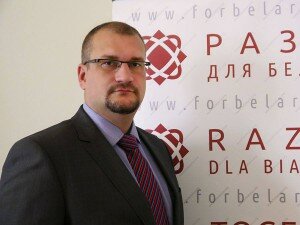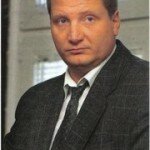
Prisoners of conscience in Belarus are still behind bars, the observers and politicians believe that the Belarusian authorities continue to trade political prisoners. But Dzmitry Barodka, coordinator of the civil campaign “Together for Belarus,” believes that soon, the situation should be changed. He told to Palitviazni.info why and what are the reasons for that.
Dzmitry Barodka: I think that now, the situation has not changed fundamentally in comparison with previous years. After all, political prisoners are still behind bars. And even though Belarusian civil society and political organizations demanded a number of times to release political prisoners, and called on the representatives of the European countries to assume the position and contribute to their liberation, nothing in fact has changed. On the one hand, the European Union is trying to take some steps against the Belarusian authorities, and in consequence some people are excluded from the list of people who can enter the EU. But the Belarusian regime is not going in that direction. We do not see any compromise, but we see that he is holding to his position and even requires that the dialogue between Brussels and Minsk took place on his terms.
– The European Union has also expressed its fundamental position. In this way, the two sides remain at their own positions. Will this situation change, or we are going to remain in this deadlock?
Dzmitry Barodka: I think that the lull will last only until 2015. Namely, until the presidential elections in our country. And then we will see the game, the real trade performed by Lukashenko. The more that this political trafficking of human beings virtually never ends. But before an important political event in the country like the presidential elections, this embarrassing process will flourish.
– Usually, when it comes to the issue of trade in political prisoners, we are talking only about the two sides: the regime and the EU, but why do not we talk about civil society in the country? The citizens? What is the impact of the socio-political forces on the current situation in the country?
Dzmitry Barodka: Unfortunately, neither political nor semi political structures in our country today do not have a major impact on the Belarusian society. But they can be a voice that can sound on the behalf of the democratic part of Belarusian society. And this voice can be heard in the West. Unfortunately, we also note that some politicians are talking about the need for dialogue with the authorities. I agree with this in principle: the dialogue is very much needed. But under certain conditions.
– The release of political prisoners?
Dzmitry Barodka: Yes.
– We are aware of the little impact of opposition politicians on society, so what is a way out of this situation? How to change it?
Dzmitry Barodka: In fact, if there was the answer to this question, it would not be such a problem. Unfortunately, it exists for almost twenty years. It seems to me that the change is possible only if the Belarusian democratic groups start to speak with one voice. Today we can see that there is a division both in Belarus and abroad among the representatives of democratic structures. And we see that each structure has its own personal message. Of course, there is a consensus, but it only concerns certain issues. Definitely, there is a common position regarding the political prisoners, but in other cases there are significant differences. But in addition to the unified voice, one must also reach out to European politicians, politicians of other countries with the message that Belarus is an interesting country for the European Union and to the United States. Incidentally, it is possible. For now, even the European Union has paid practically no attention to Belarus.
– As far as Belarusian society is concerned, we often hear that the citizens of our country are intimidated or do not have access to information on, but how to solve these problems and make people to be more active?
Dzmitry Barodka: I think the problem lies not only in Belarusian society, but also in civil society leaders, leaders of political parties who today have nothing to offer to the public. The public opinion wants change. Citizens want to fight for their rights, but do not have real leaders who could be at the forefront of this movement. For example, protests during election campaigns are very strong, people come out despite the intimidation, despite the risks, people take to the streets and are willing to fight for their rights. They want to go out and once and for all solve the problem. Unfortunately, there is no organization that could stand on the head of, say, the process, the protest movement.




